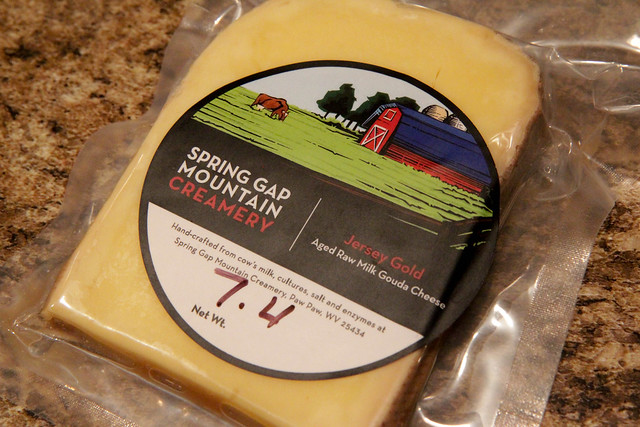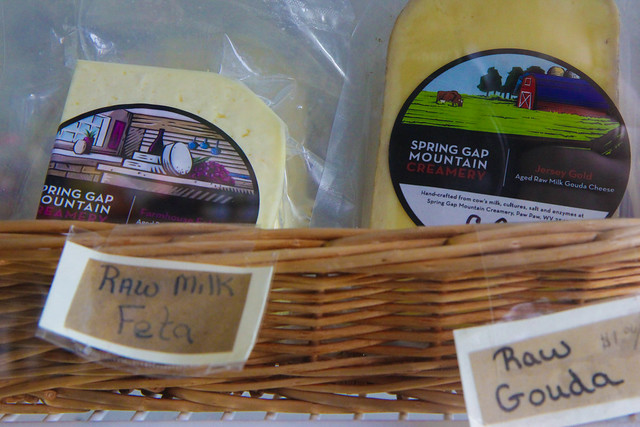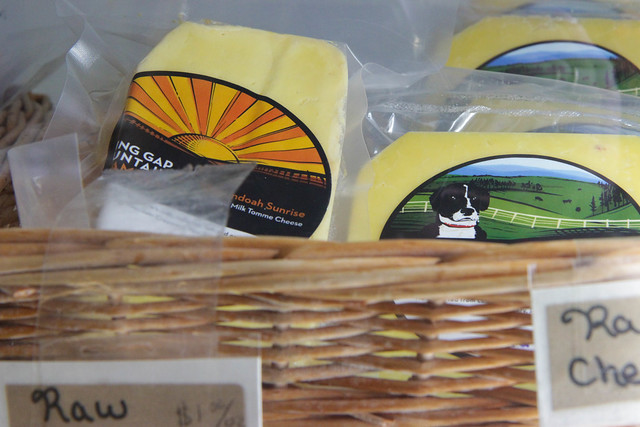Here's a column I did recently on raw cheese creamery Spring Gap Mountain Creamery for the Charleston Gazette-Mail:
 Tucked away in the hills of the Eastern Panhandle is a small creamery that produces rich, smooth cheeses.
Tucked away in the hills of the Eastern Panhandle is a small creamery that produces rich, smooth cheeses.Located in the town of Paw Paw, Spring Gap Mountain Creamery has been churning out cheese for about eight years. There’s just one thing: It’s raw.
The cheeses are made with raw, or unpasteurized, milk and then aged for a minimum of 60 days. Pasteurization is the process of heating the food to kill dangerous pathogens like listeria, E. coli and salmonella. Then, vitamins like A and D are added back into the milk.
The drinking — and selling — of raw milk has been hotly contested in the West Virginia Legislature in the past, with opponents saying it’s unsafe, and proponents claiming raw milk is healthier.
But Penelope Sagawa thinks it just tastes better.
“When you’re boiling the milk, you’re killing everything in it, then putting back in vitamins. With milk that comes out of a cow, it still has micronutrients in it. We use that milk and make cheese,” said Sagawa, who owns Spring Gap Mountain Creamery along with her partner Jurgen Schelzig.
“We don’t skim cream; we just take the milk and make it directly into cheese,” Sagawa said. “So the extra butterfat and the stuff naturally in the milk comes out in the cheese, making it richer and creamier and, in general, a more full flavor than other cheeses.”
It’s a loaded product — there are some political implications associated with raw milk. But, the addition of another local cheese option, especially one so rich and creamy, in a cheese-scarce state gives me pause.
Sagawa and Schelzig didn’t set out to make a political statement; rather, they left their 9-to-5 jobs in Washington, D.C., for a mountain getaway and fell in love with a property in West Virginia they decided to call home full-time.
They mulled a few ventures like vegetables, but if the crop fails, you have nothing. Fruits were nixed because an orchard would take years before bearing fruit. Chickens were risky because if they don’t lay, you can’t make it, she said.
That’s when they landed on cheese.
Cheese was interesting to them. Few people were making it, and the couple could learn the craft on their own. The pasteurization equipment, though, would cost upward of $25,000, which wasn’t financially feasible. So they instead opted to go raw, eliminating the need for costly pasteurization machinery.
 The couple buys their milk from Hedgebrook Farm in Winchester, Virginia, which has a small herd of about 25 Jersey cows; Jersey cattle tend to have a higher butterfat content than others, Sagawa said. They drive a stainless-steel milk tank to the farm after the farmer, Kitty Hockman-Nicholas, does her morning milking, and they truck 350 gallons of raw milk back to West Virginia to turn into cheese the same day. Then the cheese sits.
The couple buys their milk from Hedgebrook Farm in Winchester, Virginia, which has a small herd of about 25 Jersey cows; Jersey cattle tend to have a higher butterfat content than others, Sagawa said. They drive a stainless-steel milk tank to the farm after the farmer, Kitty Hockman-Nicholas, does her morning milking, and they truck 350 gallons of raw milk back to West Virginia to turn into cheese the same day. Then the cheese sits.“The [Food and Drug Administration] requires a 60-day minimum aging process for raw milk cheese. Cheese cultures added to the milk crowd out any potentially harmful bacterial growth and is considered ‘self-pasteurized,’” Sagawa said.
After 60 days, you can purchase Jersey Gold gouda, Shenandoah Sunrise tomme, Sophie’s Select cheddar, West Virginia Blue, Farmhouse Feta and Bloomery bloomy rind cheese.
This type of cheese, which potentially raises questions of safety, also provides another locally made cheese option. There aren’t a ton of cheesemakers in West Virginia, and creating more opportunities for customers who love cheese — like me — seems like it could only be better for our growth as a state.
Do risks outweigh the benefits? That, I don’t know. The FDA considers it safe. And I’ve had my fair share and can attest to its deliciousness.
So, what do you think? Does raw cheese get a raw deal?
For more information or to find out where to purchase the cheese, visit www.springgapmtn.com/index.cfm.
Candace Nelson is a marketing and public relations professional living in Morgantown. In her free time, Nelson blogs about West Virginia food culture at CandaceLately.com. Find her @Candace07 on Twitter or email Candace127@gmail.com.
Spring Gap Mountain Creamery’s Quick and Easy Stovetop Mac and Cheese
Makes four servings
2 large eggs
1 12-ounce can evaporated milk
1 teaspoon dry mustard dissolved in
1 teaspoon water
2 teaspoon salt
1/4 teaspoon pepper
1/4 teaspoon hot sauce
2 cups dry pasta (macaroni, small shells, penne, etc.)
4 tablepoon unsalted butter
3 cups shredded cheese (we use a mix of Jersey Gold gouda and Shenandoah Sunrise tomme or Sophie’s Select cheddar)
Bring 2 quarts water to boil in large pot with 1 1/2 teaspoon salt.
Add pasta, stir and cook until al dente.
Drain pasta and return to pot over low heat.
Add butter and stir to melt.
Mix eggs, 1 cup evaporated milk, mustard mixture, 1/2 teaspoon salt, pepper and hot sauce in bowl.
Add egg mixture and 2 cups of cheese to pasta and stir until thoroughly combined and cheese starts to melt.
Gradually add remaining evaporated milk and cheese, stirring constantly until hot and creamy, about 5 minutes.
Serve immediately.



0 comments